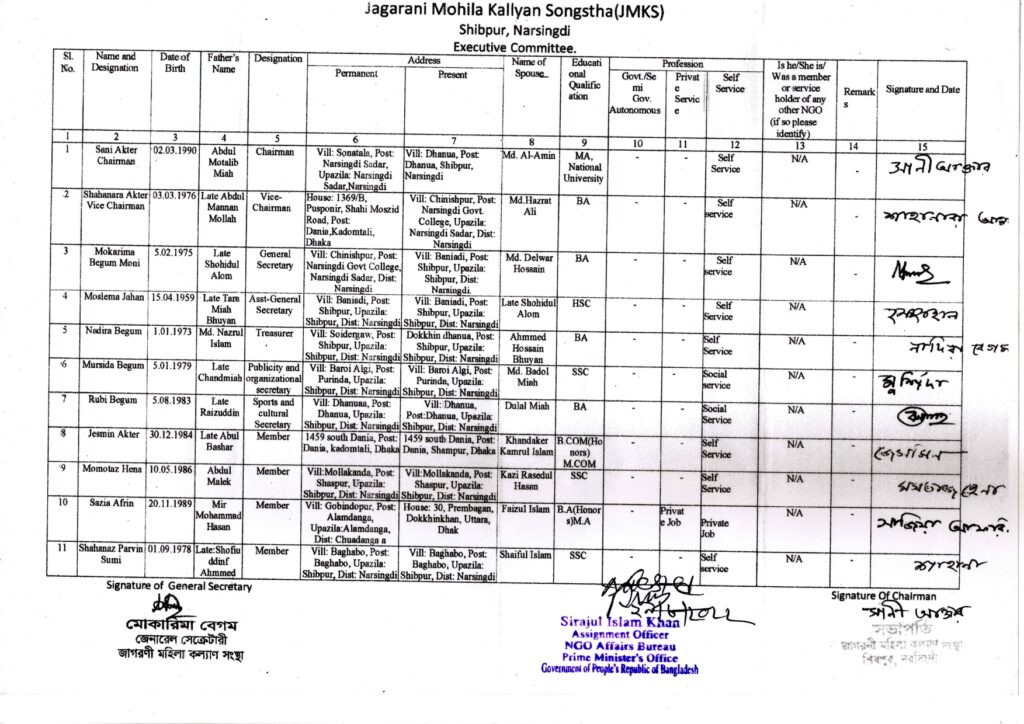Executive Committee

A strong and highly educated executive committee is of paramount importance for an NGO like Jagorani Mohila Kallyan Sangstha. The individuals mentioned above, with their educational qualifications and experience, can play a pivotal role in fulfilling the organization’s vision of empowering underprivileged women and driving positive changes in society.
The educational qualifications of the executive committee members are a testament to their commitment to personal growth and development. Mrs. Sani Akter, the Chairman, holds a Masters of Arts degree, while Mrs. Mokarima Begum Moni, the General Secretary, has a Bachelor of Arts degree. Their dedication to continuous learning can positively influence the organization’s policies and decision-making processes.
Mr. Md. Delwar Hossain, the Executive Director, brings valuable expertise and extensive experience of working with major NGOs in Bangladesh like DORP, VARD, and RRF. His prior involvement in prominent NGOs demonstrates his understanding of the challenges and opportunities faced by NGOs in the region. His experience can lead to the implementation of best practices and innovative strategies within Jagorani Mohila Kallyan Sangstha.
The executive committee’s social backgrounds, connection to the women in the roots enable them to engage in strategic planning with a deeper understanding of complex social issues, policy-making, and community development. This empowers them to develop well-informed and evidence-based plans to address the specific needs and concerns of underprivileged women in society.
Furthermore, their educational qualifications and experience equip them to network effectively and collaborate with various stakeholders, including government bodies, donors, and other NGOs. Building strong partnerships and collaborations can enhance the organization’s capacity to access resources, share knowledge, and create a more significant impact in the community.
The committee members are better equipped for effective governance, as their experience, regular connection to the women empowered, and the willpower of helping the society foster critical thinking, analytical skills, and communication abilities. This enables them to critically evaluate programs, monitor progress, and make informed decisions, ensuring transparent and accountable operations.
It is noteworthy that the executive committee comprises only women. This approach aligns with the organization’s mission of empowering women in society. By empowering women within the organization first, it sets an example and creates a supportive environment for women to thrive and take on leadership roles. Women’s representation in leadership positions fosters gender equality and challenges societal norms, promoting a culture of empowerment and progress.
Moreover, the executive committee’s academia, participation in global seminars, and experience serve as role models for the women served by Jagorani Mohila Kallyan Sangstha. Their achievements can inspire and encourage women to pursue theirs and contribute to a cycle of empowerment and progress within the community.
In conclusion, the strong and educated executive committee at Jagorani Mohila Kallyan Sangstha plays a pivotal role in the organization’s growth and the betterment of women in society. Their knowledge, expertise, and dedication contribute to driving positive change, advocating for women’s rights, and implementing effective programs that uplift underprivileged and marginalized women in Bangladesh. By empowering women within the organization, they set a powerful example for societal empowerment and work towards creating a more inclusive and equitable future for women.
